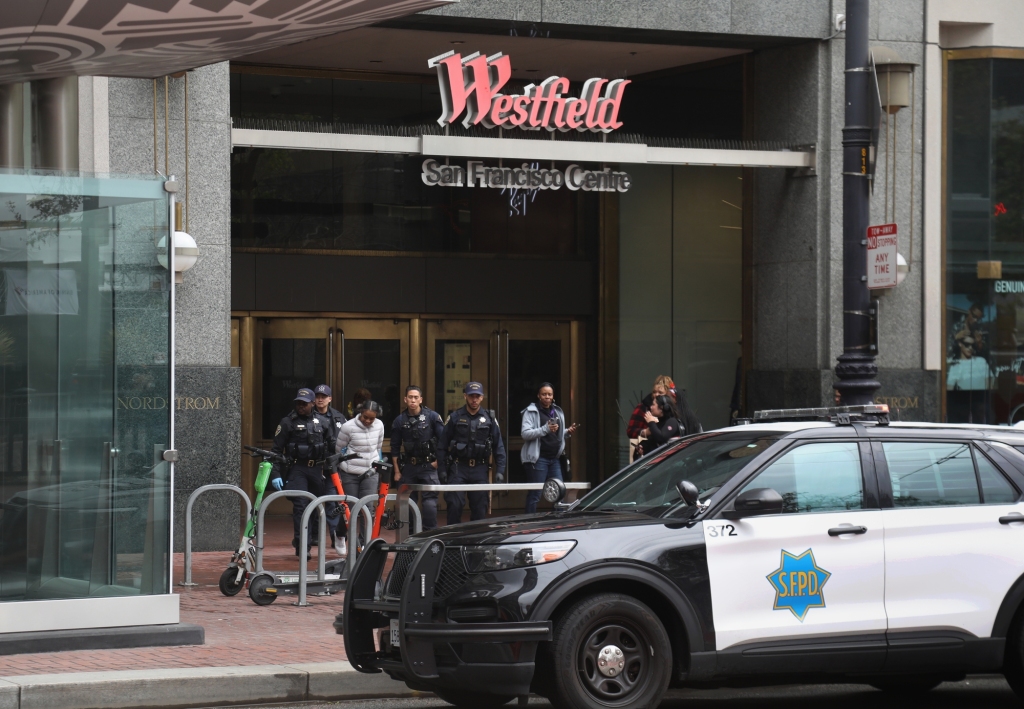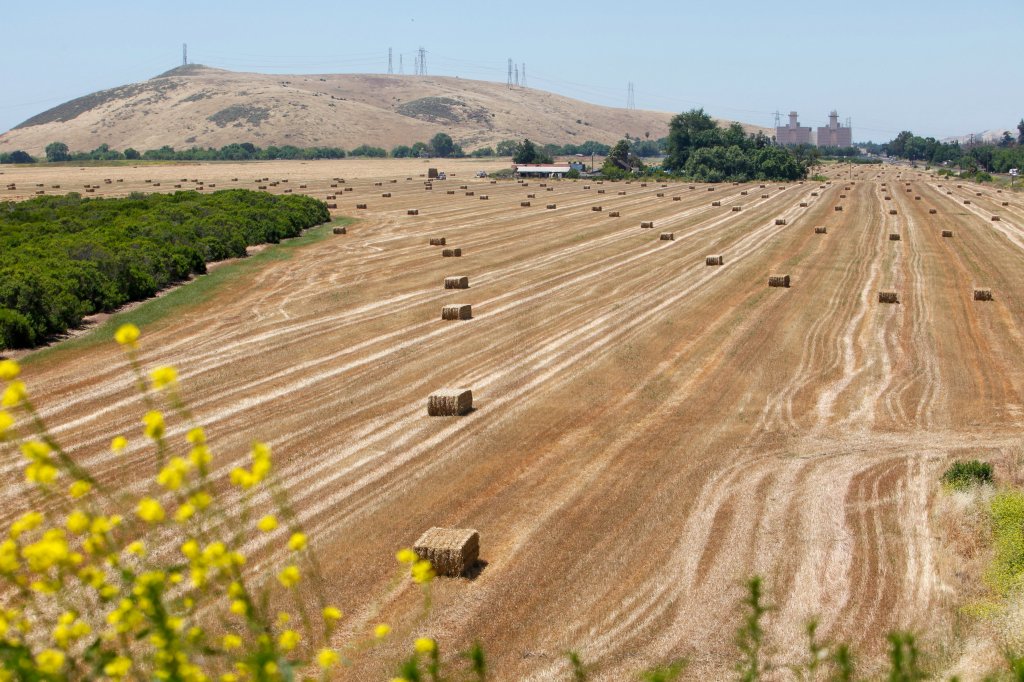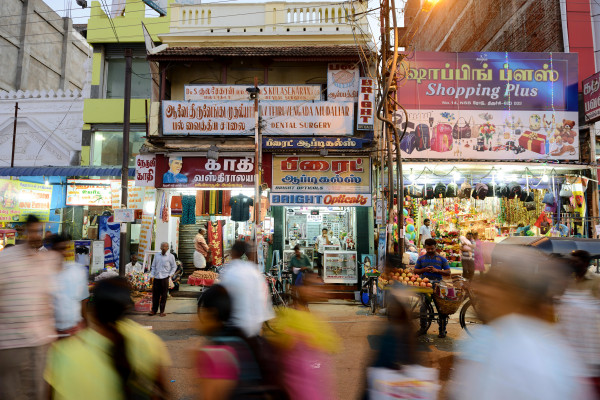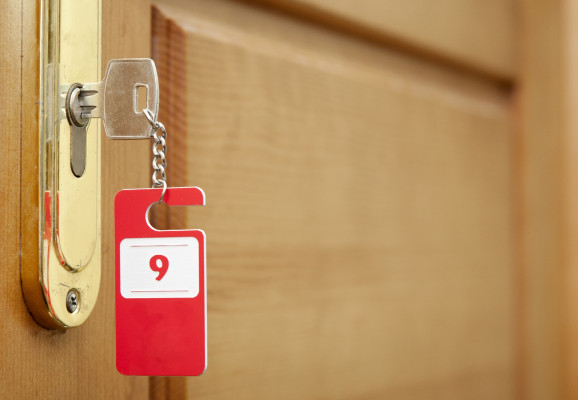On a recent gloomy afternoon in downtown San Francisco, a handful of tourists waiting to board the city’s famous cable cars watched paramedics strap a barefoot man, moaning and writhing in the throes of an apparent mental health crisis, onto a gurney. As he was loaded into a flashing ambulance, another man frantically shouted obscenities toward police officers at the scene.
Just across the street, Amy Hahn was finishing dress shopping at the Nordstrom store in the Westfield mall. She planned to make a beeline to the nearest BART station. “I am wary of being out in that area,” said Hahn, 26. “I like to minimize that.”
Nordstrom confirmed last week it plans to close the flagship store this summer, along with the nearby Nordstrom Rack — two of the most prominent department stores in the heart of the city. The company cited the changing “dynamics” of downtown, a thinly veiled reference to the perception that crime and homelessness are out of control.
Police data may show otherwise — violent crime has actually fallen in San Francisco in recent years, though property crimes have spiked. And unlike most of the rest of the Bay Area, the city’s homeless population dipped slightly in 2022, according to the latest count. Still, there’s no doubt that San Francisco’s downtown is in crisis.
It’s not the only one. All three of the Bay Area’s largest cities are staring down huge setbacks to their efforts to revitalize urban cores hollowed out by a once-in-a-generation pandemic.
Last month, the Oakland A’s announced the team was decamping for Las Vegas, throwing into flux the city’s plans to redevelop Howard Terminal at the Port of Oakland. The team is leaving behind a $12 billion proposal for a gleaming waterfront stadium with new housing and retail at the site. In San Jose, Google recently announced it was reassessing the timeline for its sprawling Downtown West project, which city officials hope will add homes, shopping and office space for thousands of workers.
Factors cited in the decline of these Bay Area downtowns are numerous: crime, homelessness, income inequality, remote work, online shopping, housing shortages and poor transit alternatives. As the region emerges from the pandemic, an existential question has emerged: Are these challenges the beginning of a “doom loop” that effectively transforms downtowns into ghost towns? Or will the Bay reimagine its relationship with its city centers?
In San Francisco, officials concede a string of high-profile violent attacks, pockets of open-air drug dealing and other safety and quality of life concerns have hampered the city’s recovery after thousands of workers emptied out of downtown offices.
“Public safety is the number one issue I hear about from residents and small businesses every day,” Mayor London Breed said when announcing a measure to increase police overtime in March.
In Oakland too, business owners cite crime as the primary culprit for the challenges facing downtown.
“We get break-ins, four or five businesses every single night in Oakland,” said Ali Albasiery, the owner of a ShopRite grocery. “People are fed up. Some stores are closing up early because of this craziness going on.”
Albasiery said former customers now do their shopping in Pleasanton or Dublin because they’re afraid their cars will be broken into if they come to Oakland. Business owners are afraid to make claims against their insurance because they’re worried they’ll get booted off their policies.
“Businesses are hurting really bad,” Albasiery said. “It’s almost like the Wild West.”
In San Jose on Thursday, Mayor Matt Mahan walked through downtown and met with local businesses alongside law enforcement to emphasize his plans to double the rate at which new police officers are hired. Like other Bay Area mayors, he’s also prioritized building more homeless shelters, increasing access to treatment centers and cracking down on encampments.
“If people don’t feel safe, it’s hard to convince them that anything else matters,” Mahan said.

Officials in San Jose have wrestled with how to reinvigorate the downtown core for decades. In 2021, the city scored a major victory when it approved Google’s plans to build a massive 80-acre master-planned neighborhood near the SAP Center and Diridon Station.
But the development was cast into uncertainty in February when, on the heels of moves to cut jobs and slash office space amid growing economic unease, the tech giant said it was “assessing how to best move forward with Downtown West.”
While the company says it’s committed to the multi-decade project — planned for 4,000 homes and office space for up to 20,000 workers — the news is raising fresh concerns about San Jose’s downtown aspirations.
Bryan Garrett, the longtime owner of Cafe Rosalena near the site of the planned project, said many local business owners are worried Google won’t follow through on its promise to revitalize the sleepy western half of downtown. “For lease” signs continue to pop up nearby along The Alameda, a portion of the historic El Camino Real road that the city has long targeted for redevelopment.
“It would give much-need life to a city with no soul,” Garrett said.
Regionally, plans to revitalize downtowns are as wide-ranging as the challenges. Various local officials, advocacy groups and business interests have pushed for more mixed-use housing, better access to transit, adding bike lanes, removing freeways and increasing green spaces.
The hope is to prevent a dreaded economic “doom loop,” which could happen like this: Office buildings remain empty. Thus, stores and restaurants that used to serve downtown workers continue to shutter. Property and sales taxes then plummet. Forced to slash essential services, cities fail to get a handle on homelessness and crime, causing even more people to avoid city centers. The vicious cycle feeds on itself.
To stave off that fate, city leaders must imagine new ways to make downtowns places where people want to spend their time, said Gary Dillabough, a developer behind many large commercial buildings in San Jose. He suggested transforming vacant offices into museums, technology centers or even indoor farms.
“You can let the wind blow you, or you can create your own weather,” Dillabough said.
Across the Bay Area, cities are taking the first steps to do so.
In Oakland, Mayor Shen Thao said the city is moving forward with other redevelopment opportunities for Howard Terminal — even without the A’s. Just this week, a company that crafts creative works spaces signed a deal to manage three floors and recruit new tenants to the iconic Tribune Tower building downtown.
“I don’t believe this city is defined by Major League Baseball,” Thao said last month. “We are working really hard to ensure that (future) developers can be fast-tracked if the development makes sense to the city.”
In San Francisco, a program called “Vacant to Vibrant” is offering grants to lure local pop-ups downtown. And new rules, approved last week by the city’s planning commission, could make it easier to convert empty commercial buildings to housing and allow more uses for vacant retail space in Union Square, San Francisco’s central shopping hub now plagued with boarded-up storefronts.
Mayor Mahan is proposing a similar grant program for downtown San Jose. City officials there are also encouraging commercial-to-residential conversions, though developers say such projects remain a difficult and expensive proposition.
None of these plans will transform downtowns overnight. But to those invested in the future of these spaces, their revival is a matter of when, rather than if. Beyond economics, downtowns have a natural draw. They are historic centers, a critical part of the identity of a city, the place where it all began. The old model may have changed. But civic leaders believe there will be a new one.
“We’ve kind of lost our mojo a little bit,” said Jim Wunderman, the CEO of Bay Area Council, a regional business association. “But people that are writing off these incredible Bay Area cities, they’re making a mistake.”











